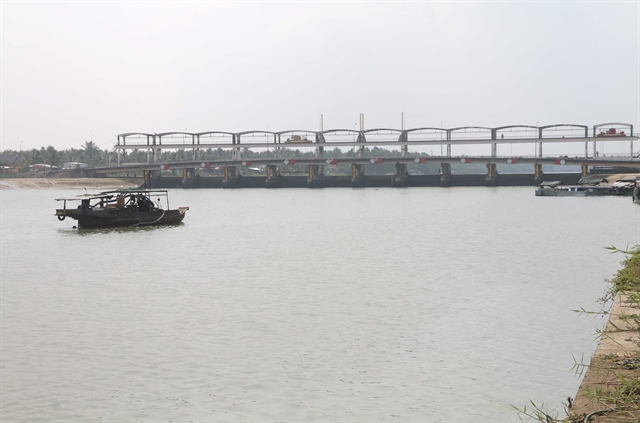
|
| The Láng Thé saltwater prevention sluice in Trà Vinh Province’s Càng Long District. – VNA/VNS Photo Thanh Hoà |
HCM CITY – Saltwater intrusion from the sea into the Cửu Long (Mekong) Delta’s waterbodies is expected to peak in March, according to the Directorate of Water Resources.
The country’s largest producer of rice, fruit and seafood suffers from the intrusion in the dry season every year.
The directorate said saltwater with salinity of 4 grammes per litre is likely to enter 45-55km into the Mekong River’s tributaries this month, 5-8km deeper than in the same period last year.
Most crops can only tolerate salinity of 1 gramme per litre.
Nguyễn Mạnh Hùng, head of the directorate’s irrigation and operation management division, said the intrusion would be worse than normal but not as bad as the 2015-16 and 2019-20 seasons.
To mitigate the problem, farmers have sowed their rice earlier and increased storage of water to irrigate fruit trees, he said.
So the delta is not expected to face much damage from saltwater intrusion if there are no unusual happenings, he said.
In saltwater-prone areas, rice farmers sowed seeds in October and November and would harvest their crop amid the peak of the saltwater intrusion in March, he said.
The directorate would guide farmers in how to store water for irrigating fruit orchards, he said.
It has warned farmers to use water frugally to ensure there is enough for the next summer-autumn crop.
Before the ongoing dry season local authorities tightened monitoring of saltwater intrusion to inform the public to take preventive measures and encouraged households to store rainwater.
To secure water for irrigating orchards, farmers store water in ponds in them. – VNS
- Reduce Hair Loss with PURA D’OR Gold Label Shampoo
- Castor Oil Has Made a “Huge” Difference With Hair and Brow Growth
- Excessive hair loss in men: Signs of illness that cannot be subjective
- Dịch Vụ SEO Website ở Los Angeles, CA: đưa trang web doanh nghiệp bạn lên top Google
- Nails Salon Sierra Madre
 VnExpress News The News Gateway of Vietnam
VnExpress News The News Gateway of Vietnam





